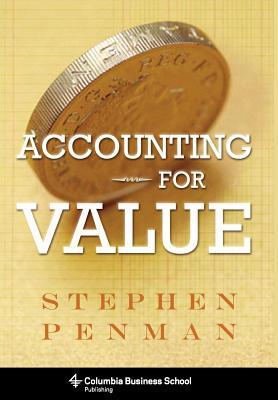Accounting for Value
Accounting for Value teaches investors and analysts how to handle accounting in evaluating equity investments The book s novel approach shows that valuation and accounting are much the same valuation is actually a matter of accounting for value.Laying aside many of the tools of modern finance the cost of capital, the CAPM, and discounted cash flow analysis Stephen Penman returns to the common sense principles that have long guided fundamental investing price is what you pay but value is what you get the risk in investing is the risk of paying too much anchor on what you know rather than speculation and beware of paying too much for speculative growth Penman puts these ideas in touch with the quantification supplied by accounting, producing practical tools for the intelligent investor.Accounting for value provides protection from paying too much for a stock and clues the investor in to the likely return from buying growth Strikingly, the analysis finesses the need to calculate a cost of capital, which often frustrates the application of modern valuation techniques Accounting for value recasts value versus growth investing and explains such curiosities as why earnings to price and book to price ratios predict stock returns By the end of the book, Penman has the intelligent investor thinking like an intelligent accountant, better equipped to handle the bubbles and crashes of our time For accounting regulators, Penman also prescribes a formula for intelligent accounting reform, engaging with such controversial issues as fair value accounting. Best Read Accounting for Value Author Stephen H. Penman For Kindle ePUB or eBook – kino-fada.fr Dry for some but very interesting and well done for value investors The discussion on the mechanics of mark to market accounting the philosophy of accounting are very interesting For 99% of people this would be like reading a plumbing manual, for investors it is very helpful P...Strictly not for beginners Book is based totally on accounting , Each chapter goesin depth than previous one , It s a Super text for accounting Investing professional Each concept takes a little time to get your head into but end of it worth the time spent on it.IT is a very practical book on valuation You can follow the model in it and find the value of a stock as I did The logic for the valuation is very strong.By the way, valuation is based on the Accounting financial sheets data So it is plausible and workable.The great interesting point is to use the reverse engineering method to find the growth rate factor for analyst to judge The book also provided a simple way to help find the Cost of Equity without using the CAPM model There is only a big IT is a very practical book on valuation You can follow the model in it and find the value of a stock as I did The logic for the valuation is very strong.By the way, valuation is based on the Accounting financial sheets data So it is plausible and workable.The great interesting point is to use the reverse engineering method to find the growth rate factor for analyst to judge...A very interesting take on accounting, quite unlike a lot of other accounting books.But of course, the author finds a needs to quantify growth and such through terms like residual earnings growth.I like that the book re enforces the need to be skeptical about accountingAlso has a good take on relying too much on cash flows, and keeping in mind conservative accounting that depresses actual business performance.It s an easy read for a practitioner and also a brilliant read for a student of value i A very interesting take on accounting, quite ...A great read i mean as great as an accounting book possibly an be the key message is that good accounting should attempt to report only facts to shareholders investors and keep away from speculation.A good investor on the other hand should clearly separate the facts from speculation in their analysis before investing in a company The approach described in the book for this is simple yet powerful.Lastly, the book focuses on fundamental analysis for investment and cautions against fair value ...Very good Surprisingly makes me want and realize that I need to learnaccounting best concept in the entire book is reverse engineering for the implicit assumptions in stock prices One must solve for x rather than coming up with all of the variables in something like the DCF, wit...Great overview of accounting while employing a value mentalityRead it Re read it To get the maximum out of it, one needs to read the concepts in the book regularly P.S Basic accounting knowledge is required before one can understand it.Recommended by Prof SanjayPresents a good framework for valuing firms I like that the author recognized the relevance of DCF and relative valuation models while building the case for residual income style approach.

- English
- 03 July 2017 Stephen H. Penman
- Hardcover
- 244 pages
- 0231151187
- Stephen H. Penman
- Accounting for Value